The Society of Indian Automobile Manufacturers (SIAM) hosted its 60th Annual Convention virtually, titled ‘Re-Building the Nation, Responsibly’. During the convention, the panelists spoke about possible ways that can help in fostering increased localisation in the Indian automobile sector, improve ease-of-doing business scenario in the country and the steps that are to be undertaken to create ‘Brand India’ so as to harness the country’s export potential. They deliberated on viable pathways which will lay the ground work for a truly ‘Atmanirbhar’ automotive sector.

Applauding the government’s ‘Atmanirbhar Bharat’ mission, Dr. Pawan Goenka, Past President, SIAM, and Managing Director, Mahindra & Mahindra, commented: “The auto industry today is a shining example of Atmanirbhar Bharat. Apart from the last year, the sector has been growing at 16% CAGR over the last 25 years and that is truly an impressive number to reckon with. The sector has made sizeable investments in research and development and currently employs around 37 million people in the entire value chain. Going forward, we will look at augmenting our exports, reduce imports, create more jobs and up our investments in research and development.”
“In the automotive components space, our imports are to the tune of Rs. 1 lakh crore and we are looking at reducing the number in 4-5 years. For this to happen, we need to rethink, re-strategize, reorganise and implement steps such as reducing current logistics costs, relaxing duties and taxes, entering into FTAs and similar other trading pre-requites with bigger automobile markets,” he added.
Talking about numbers, Dr. Goenka elaborated: “India is currently the largest exporter to Central and South America. Up to 40% of our export volume currently goes to these markets, followed by Central and East Africa. However, it is important to note that exports now account for 16% of our total output, which indicates a lot of room for expansion.”

Praising the automobile industry’s resilience, adaptability and innovation potential, Guest of Honour, Piyush Goyal, Union Minister of Commerce and Industry and Railways, Government of India, commented: “In order to produce world-class export-fit products indigenously we need to build global scale plants in the auto sector that are at par with international standards. We should aim at improving the scale and quality of what we are producing and export it to the rest of the world. The key is to create a sustainable value chain.”
Also, talking from a demand perspective, Goyal said: “In the current pandemic era, we have seen the demand for shared mobility fizzing away, which was once the talk of the town. Current trends indicate that people will continue to buy cars, try out self-drive, autonomous and EVs, and therefore, as a corollary, the automobile sector’s health would eventually improve. We are a listening government and we will continue to do all that we can to help the auto industry. We will also look at devising innovative models to boost exports. Some of these that are currently prevalent include the credit guarantee model, creating automotive hubs and clusters, partnering with States to make land availability easier, and adopt a more competitive approach to domestic manufacturing.”
On increased localisation in the automotive segment, Goyal opined: “Best-in-class make and design, use of innovative technologies, smart packaging and intelligent product pricing can go a long way in fetching desired results. Skilling is another aspect that needs to be looked into if we are to ace in domestic manufacturing. Upskilling and reskilling should be treated as a priority and an industry-academia partnership is one of the best available models to achieve this goal.”

At the convention, Guest of Honour, Prakash Javadekar, Union Minister of Environment, Forest and Climate Change, Information and Broadcasting and Heavy Industries and Public Enterprises, Government of India, assured the automobile industry of support from the government in reviving demand, which has taken a dire hit owing to the pandemic. “Infrastructure is the only answer to the growth story of India and the government is looking at investing Rs 100 lakh crore towards infrastructure projects over the coming times. This will also hugely benefit the automobile industry.”
While acknowledging the auto industry’s recommendation for reduction in GST rates, he further added: “GST reduction will ultimately benefit the government and I will be taking it up with the Finance Minister and the Prime Minister’s office.” He also assured that a well-entrenched vehicle scrappage policy will come soon that will bode well for the automobile industry. “The government has now shifted lockdown to containment zones. There will be no lockdowns and supply side blockages will ease out. The government is also focusing on e-mobility by pushing for creating better infrastructure and providing incentive to electric vehicle manufacturers. Once the cost of electrified vehicles goes down, demand will increase and this segment will be highly profitable.”
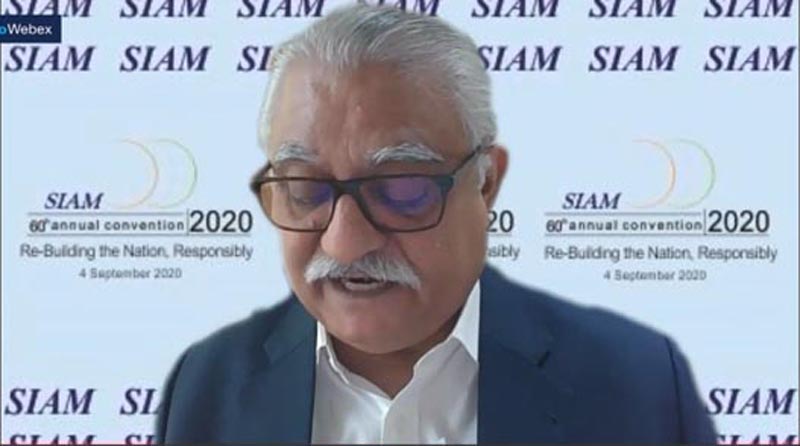
Putting across recommendations to the government towards boosting demand in the automobile sector, Rajan Wadhera, President, SIAM, and Senior Advisor, Mahindra & Mahindra, said: “While we thank the government for all the support it has extended to the auto sector, such as reduction in the repo rates, credit access, etc., we now need more specific steps to boost demand in the sector as the festive season is fast approaching. Some of the key tasks include lowering of GST rates from 28% to 18% across all vehicle categories and automotive components, an incentive-based vehicle scrappage policy and taking concrete steps towards realising the vision of the Automotive Mission Plan.”
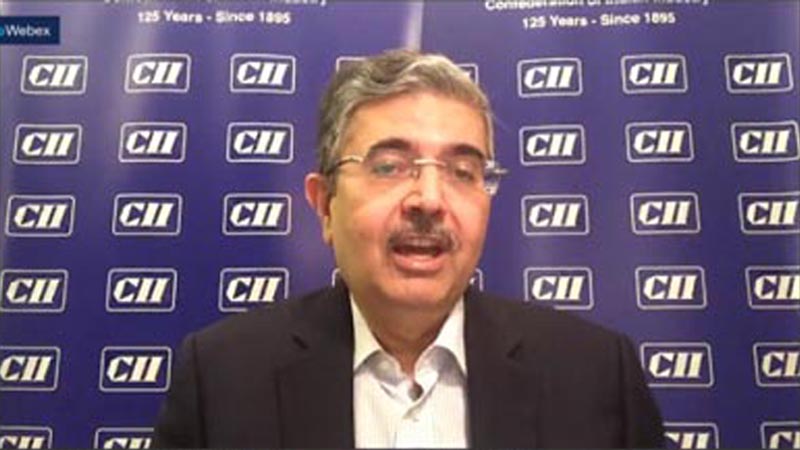
Uday Kotak, President, CII, and Managing Director and CEO, Kotak Mahindra Bank, commented: “In the last several months, the Government of India has shown high sensitivity to lives, livelihoods and the overall economy. Now is the time for the government and the industry to join hands and work in partnership to salvage the current slump. Owing to the pandemic, we are in a ‘never normal period’ with new opportunities and challenges. As the festival season is approaching, we expect to see an increase in demand. Therefore, it is now imperative for us to ease out the supply chain bottlenecks. Money is aplenty, banks are ready, willing and eager to extend easy loans and financing options. We need to make sure that OEMs do not face any supply side disruptions.”

Kenichi Ayukawa, President Elect, SIAM, and Managing Director and CEO, Maruti Suzuki India, said: “The industry is looking forward to sound development which means increase in production, sales, exports and more localization of parts including electronics. It means self-reliance, i.e., Atmanirbhar Bharat.”

Applauding SIAM President Rajan Wadhera for his exemplary leadership and steering the industry amidst these turbulent times, Deepak Jain, President, ACMA, and Chairman and Managing Director, Lumax Industries, while summing up the session, stated: “I have personally witnessed many marathon meetings across many industry sectors and the government on localisation. I am also very grateful to Minister Piyush Goyal for recognising the auto component industry as a champion sector that maximises its potential in exports.”
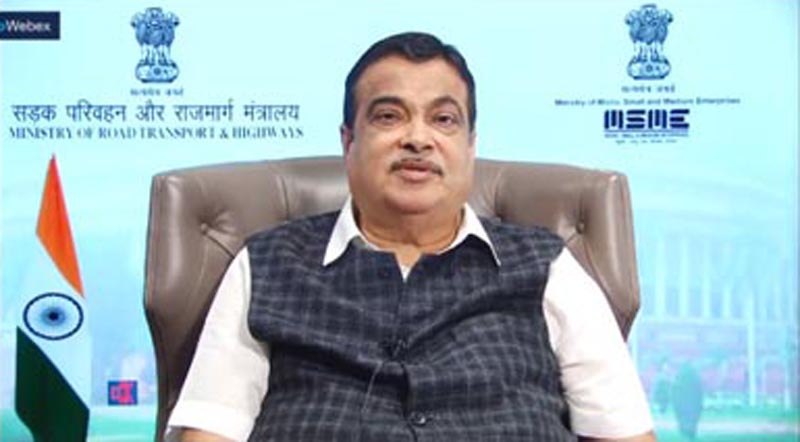
Further, amidst the multipronged challenges imposed by the ongoing pandemic, the Society of Indian Automobile Manufacturers marked its 60th Annual Convention with a series of virtual plenary sessions deliberating upon the revival and future of the automotive industry. Gracing the occasion for the plenary session on ‘A Long Term Regulatory Roadmap and Infrastructure Development’ was Guest of Honour, Nitin Jairam Gadkari, Union Minister of Road Transport and Highways and Micro, Small and Medium Enterprises, Government of India.
Welcoming the industry recommendations, the Minister said: “The industry has come to global standards on many regulatory fronts. As a regulatory Minister I cannot be more satisfied. We uphold the need for long-term regulatory roadmap and infrastructure development for the benefit of the automobile industry. It is time the country also focuses on alternative biofuel technologies such as that of ethanol, methanol, LNG, and so on. Also, I recommend the SIAM and the industry to create an independent think tank of retired industry, legal, policy and government experts to resolve industry challenges.”
“The government has changed the definition of MSME, has invested heavily in road infrastructure including 22 green express highways, is focusing on road safety guidelines and is bringing alternative cleaner fuels to India,” he added.
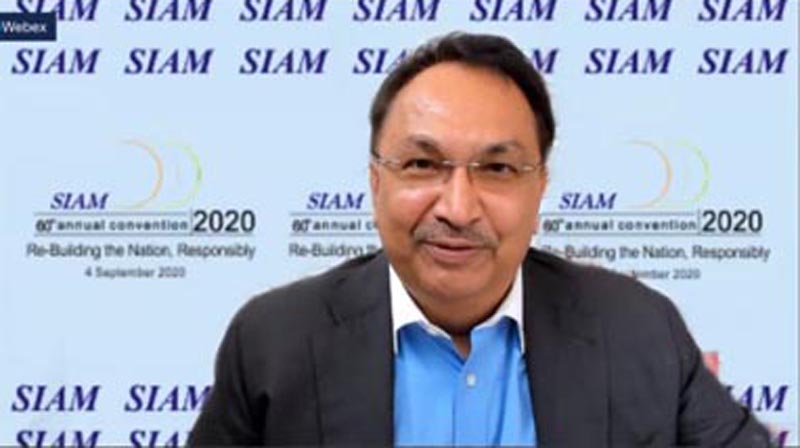
Vikram Kirloskar, Past President, SIAM, and Vice Chairman, Toyota Kirloskar Motor, said: “Over the past year, the industry has made tremendous investments in upgrading to BS VI and various technological pathways and we have lost much of our cash reserve. The impact of the recent pandemic on the industry is unprecedented.”
“We need to pause and revisit our options with regard to impending regulations. It is essential a long-term stable policy roadmap is created for the sector with phased timelines and minimal revisions. Policy interventions and regulations should focus on larger national imperatives and be technology neutral. Given the multitude of technologies and alternative fuel options, a clear national fuel roadmap would help the industry in making informed decisions. It is also important that the development of technologies should precede the implementation of regulation,” he added.
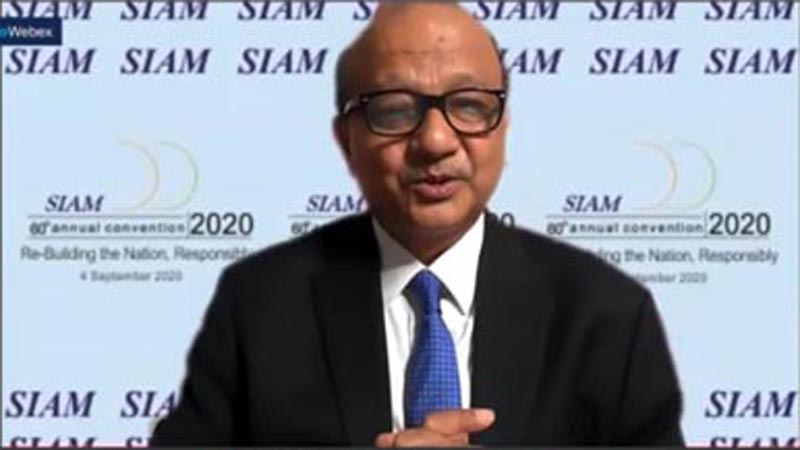
While thanking the guests and dignitaries, Vinod Aggarwal, Treasurer, SIAM and Managing Director and Chief Executive Officer, VE Commercial Vehicles, said: “We depend heavily on infrastructure development and economic growth especially for the growth of the commercial vehicles sector. We welcome the change in definition of MSMEs which has increased viability of suppliers in the business. It is our request to the government to consider including wholesale and retail trade and repair of motor vehicles and motorcycles in the MSMED Act, which will benefit our dealers and make vehicle retail business viable.”
The industry achieved the landmark feat of transitioning to the BS VI emission norms from April 1, 2020 across all vehicle segments, bringing India at par with rest of the world while meeting one of the most stringent environmental regulations for vehicles.